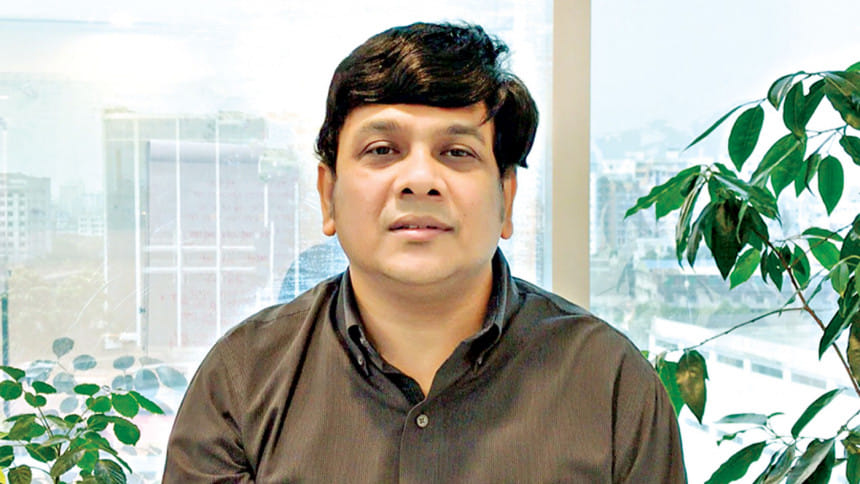Build a suitable culture to treat customers as king


'Customer is king' is a mantra which is easy to say but very difficult to apply in real life.
To prioritise the motto in any organisation, the chief executive or the top brass have to lead from the front to build a suitable culture.
This was the main takeaway from a recent interview with Sabbir Hasan Nasir, executive director of ACI Logistics.
With a vision to set up retail outlets all across the country, ACI Logistics launched Shwapno in 2008.
It has since become Bangladesh's largest grocery chain with Nasir leading it towards the horizon since December 2011.
Pragmatism, vision, goal orientation and adaptability are the key traits needed to achieve personal and professional esteem, according to the executive director.
As said by Warren Buffet, it takes 20 years to build a reputation and five minutes to ruin it.
"And I strongly believe in this," Nasir said.
To maintain the company's reputation, Nasir focuses on creating trust with customers by providing quality products.
"When a top leader practically shows that quality is his number one priority, others become bound to follow," he said, adding that customer complaints cause anxiety.
And when the top brass becomes anxious, it is felt in every sector of the organisation until things eventually get better.
This is why Nasir believes that achieving operational excellence is a daily endeavour, considering the scope for human error.
So to make its operations more effective and efficient, Shwapno arranges weekly meetings to dissect customer complaints and find solutions.
"Other than apologising to an aggrieved customer, we offer gifts and make him or her a part of our fact-finding team as an adviser," Nasir said.
Shwapno was named a 'Superbrand' by Superbrands Bangladesh for two consecutive years in 2019 and 2020.
Shwapno was also declared one of the top 10 overall brands last year, which was the fourth consecutive year it won the 'Best Brand Award' by Kantar Millward Brown and the Bangladesh Brand Forum.
The journey to the top was not an easy one though as by the time Nasir had taken the helm, Shwapno was struggling to stay afloat with 33 of its 70 outlets having closed down.
But under his stewardship, the grocery chain roared back to life.
There are currently 143 Shwapno outlets across 22 districts.
Ever since Agora became the country's first supershop in the late 90s, the industry has evolved and now accounts for 1.6 per cent of the country's $16 billion retail market.
Meanwhile, Shwapno holds a 49 per cent share of the supermarkets' market share.
Having led the brand to all these achievements, Nasir believes that it was fate that shaped him.
During his formative years, Nasir had a passion for music and even formed a band when he was a 10th grade student at the Saint Joseph High School in Khulna.
After completing his HSC, Nasir was persuaded by his father to join the department of mechanical engineering at Bangladesh University of Engineering Technology (BUET).
He also believes he was very fortunate to have started his professional career as a research assistant to Professor Jamal Nazrul Islam, a veteran physicist and cosmologist.
A year later though, Nasir shifted to the corporate world in search of financial stability and became an intern at the Bata Shoe Company, where he was later promoted to senior efficiency officer.
During his time at Bata, Nasir completed an evening MBA degree from the Institute of Business Administration (IBA) at the University of Dhaka.
He then worked in various capacities for Tetra Pak Asian Emerging Market, Dekko Accessories, Golfrate H&PC Limited in Angola and Shapla Initiative.
In June 2006, Nasir became CEO of the country's leading furniture company, Otobi.
But before joining ACI Logistics, Nasir had started his own consulting firm called, 'Road Map Limited', in 2011.
As Shwapno's executive director, Nasir kept developing himself to adapt with the fourth industrial revolution.
He strongly believes that geopolitical and macroeconomic data are important aspects for business.
"We live in a globally connected economy," he said.
Along with keeping himself updated, Nasir also ensures that Shwapno's employees are similarly skilled.
"Among more than 4,200 employees, around 2,800 are store based and are the key focus for skills training as it is here where customers interact with us," Nasir said.
Around 72 per cent of all the vegetables and 52 per cent of the fish sold by Shwapno at its various outlets are directly sourced from farmers.
So, the sourcing team members must have the skills to properly interact with the growers.
This is how Shwapno became the country's first member of the Global GAP (Good Agricultural Products) in Southeast Asia.
Besides, the brand's office support employees are also trained to be agile and understand Kanban, which is a workflow management method.
"The skill upgradation process is happening all the time," Nasir added.
Shwapno stayed open amid the ongoing coronavirus pandemic and Nasir even encouraged his frontline employees to believe that they are serving the nation in this time of crisis.
While maintaining proper health safety protocols for all employees, Shwapno did not layoff a single worker due to the Covid-19 fallout and there were no salary cuts either, the executive director said.
Shwapno found other opportunities amid the crisis as well by collaborating with delivery services like Foodpanda to expand its touchless grocery delivery service.
It also initiated the 'Phone e phone e bazaar', so that customers who avoid ecommerce platforms could place orders via a simple phone or video call.
For communicating, Nasir has one simple tip: be yourself, there's nothing to worry.
"Just give all of yourself and that's the secret," he said.
Even though Nasir has already achieved a lot in his professional career, he never gave up his passion for music.
In the past couple of years, his music career flourished as he released several tracks.
"I could never be anything orthodox because I am basically an artist. Primarily, I am a musician, but as the music industry has many obstacles, I found my living in business management," Nasir said.
"But still, I kept my artist soul with me," he added.

 For all latest news, follow The Daily Star's Google News channel.
For all latest news, follow The Daily Star's Google News channel. 



Comments